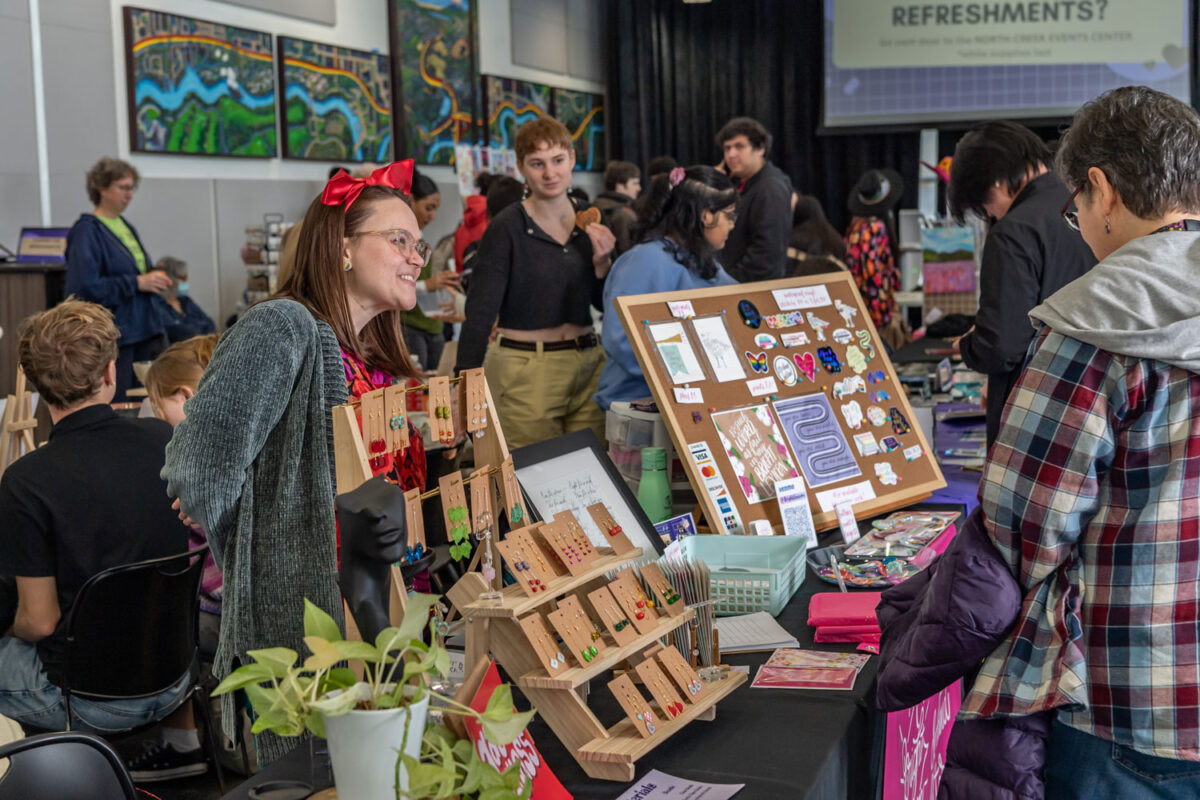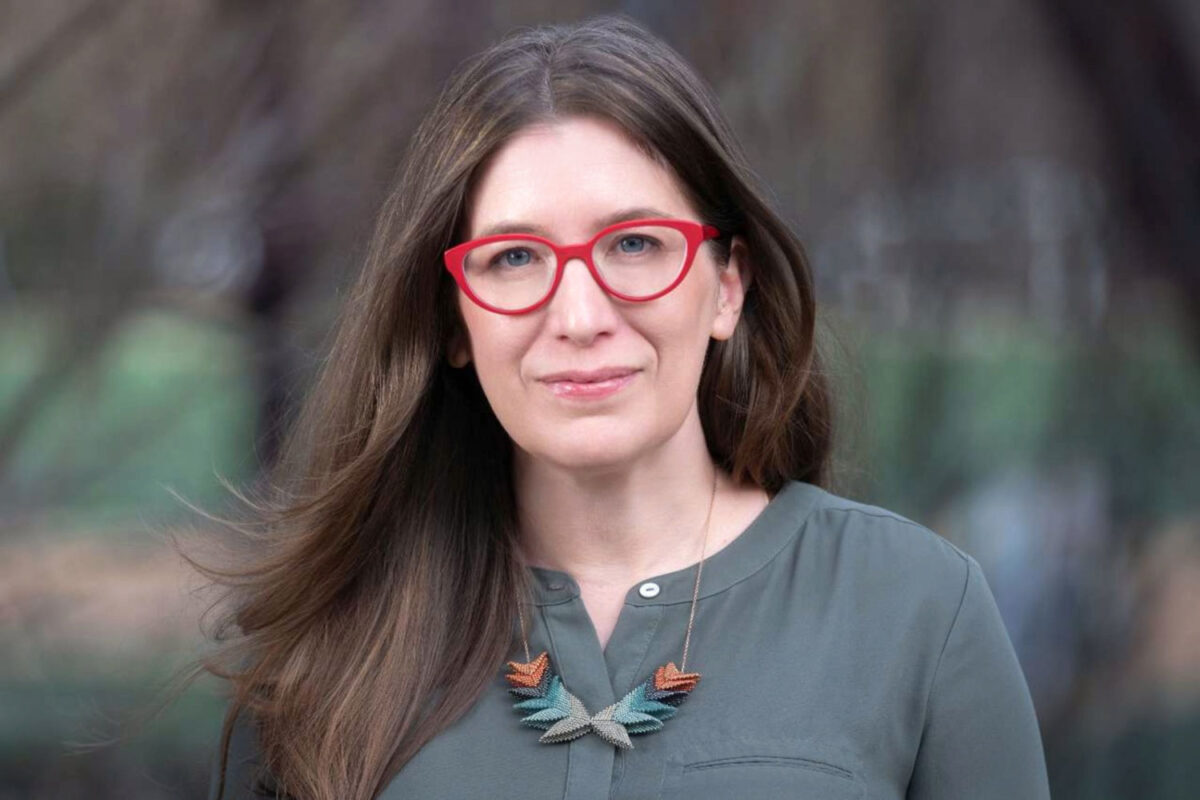The maker culture, which started in the late 20th century and has grown exponentially since the advent of the 3D printer, came to life in a special event at the University of Washington Bothell last month: Makers among students, alumni, faculty, staff and the community all came together on Valentine’s Day to showcase their creations at the first-ever Makers Fair on campus.
Jireh Reduque, program specialist in Student Engagement & Activities and a maker herself, wondered about the possibility of such an event after vending at a Makers Fair in 2023 hosted by the UW in Seattle.
“The students I work with in SEA had been asking me about my experiences as a small business owner and what it would take for them to have their own business,” said Reduque. “They inspired me to further explore the idea of a Makers Fair, which would not only give them a view into that world but also promote the amazing talents of our community.”
Makers abound
Pauline Tolentino, now assistant director for SEA, organized the event alongside Reduque. Also a maker, she was enthusiastic about bringing this burgeoning industry to campus. “The maker culture is so pervasive that I was certain we’d have a lot of people interested in vending at UW Bothell.”
She was right. More than 110 makers applied to participate, with approximately 80 chosen for the event. Products featured ranged from jewelry to art, sweet treats to slime, greeting cards to puzzles, handbags to scarves, soaps to clothing and so much more.
Reduque and Tolentino are seasoned event planners, so the usual logistics of organizing the fair were familiar. But their experience as vendors gave them insights into other needs that were potential hurdles, such as a high price to participate.
“We wanted to ensure maximum access and inclusion for these small business owners,” said Tolentino. “To do this, we would need to remove barriers such as a costly vending fee. If we could offer free parking, even better.”
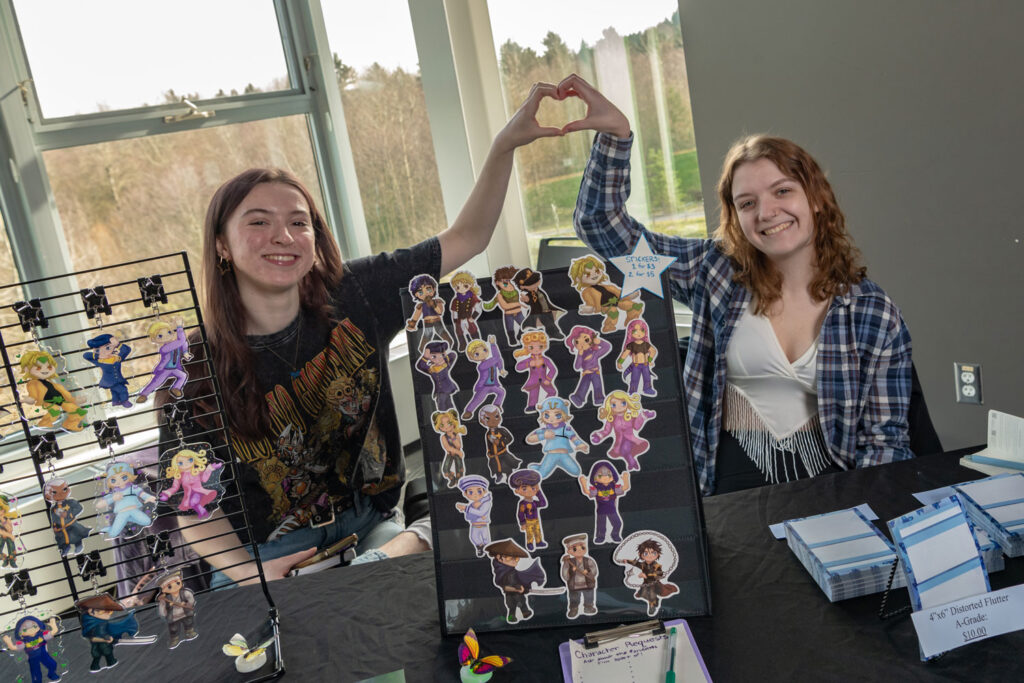
Spirit of innovation
After some research into alternative funding possibilities, the event organizers got the good news that Nancy and Ben Remak, long-time supporters of the UW, would contribute toward producing the event.
“Nancy and I are so impressed by the spirit of innovation at UW Bothell,” Ben Remak said. “Supporting the Makers Fair was a great opportunity to be part of that spirit.”
Added Tolentino, “The Remak’s support was a huge relief. It allowed the vendors to focus on marketing their creations without the worry of making enough money to cover the cost of participation. Removing that stressor was really key to them having a good time.”
The Remaks, who spent several hours at the fair talking with the makers and learning their stories, can attest to the fun of the event.
“It was thrilling to see first-hand the creativity of the UW Bothell community,” Nancy Remak said. “The vendors we talked with were so passionate about their products. That most of them were also full-time students, some even with jobs outside of their small business, was really inspiring.”
A pandemic project
Maker Kaylie Heshmati, a sophomore in Business Administration who works as marketing and public relations programmer for the Campus Events Board, appreciated meeting all the vendors around her.
“The Makers Fair was such a wonderful and empowering experience,” said Heshmati. ‘I loved seeing all the vendors setting up and then showcasing their products. I experienced the event alongside my supervisor Jireh. She was so encouraging and really motivated me to participate, and for that I will forever be thankful.”
Heshmati owns GlamByKaylie, a business she started in 2021 as a way to explore her creativity and as a source of engagement during the coronavirus pandemic. Captivated by jewelry ever since she was a little girl, Heshmati said she has learned a lot by creating it herself, honing her craftmanship over time.
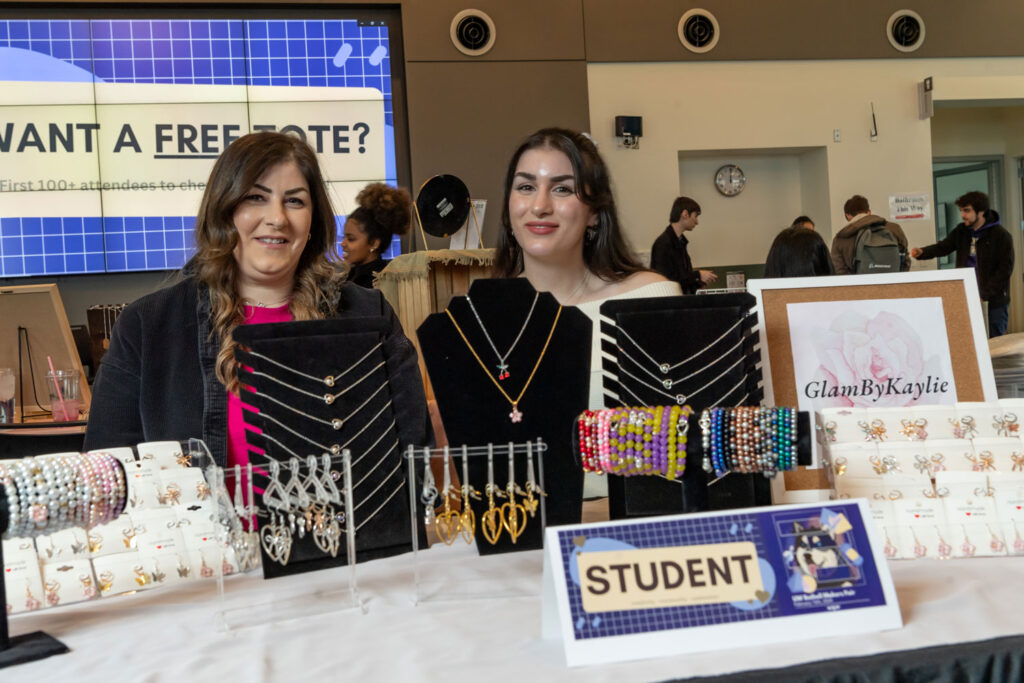
Beyond its aesthetic purposes, she believes that jewelry carries stories, memories and emotions that can be passed down through generations. Even the process of creating is generational, as Heshmati works with her mother to ensure each piece of jewelry is visually appealing and enjoyable to wear.
“Creating and vending together has been so rewarding,” she said. “I’m a first-generation college student, and the fair was an opportunity for my mother to learn more about my UW Bothell community. She got to witness joy through my perspective.”
Advocacy through art
Alec Mullen-DeLand, a senior in Media & Communication Studies, has been drawing, painting and practicing creative hobbies since just before the pandemic. He spent his time in quarantine dedicating himself to these pursuits and said he learned much from the consistent practice the “downtime” afforded him.
Mullen-DeLand made his first zine in summer 2022 and found the zine community to be friendly and supportive. He was motivated to start sharing his art online and at events, then founded his company, AlecMDArt, during spring break 2023. In addition to zines, he specializes in creating digital and traditional art, prints and stickers. He said his creations allow him self-expression, centering around themes of nature, love and queerness.
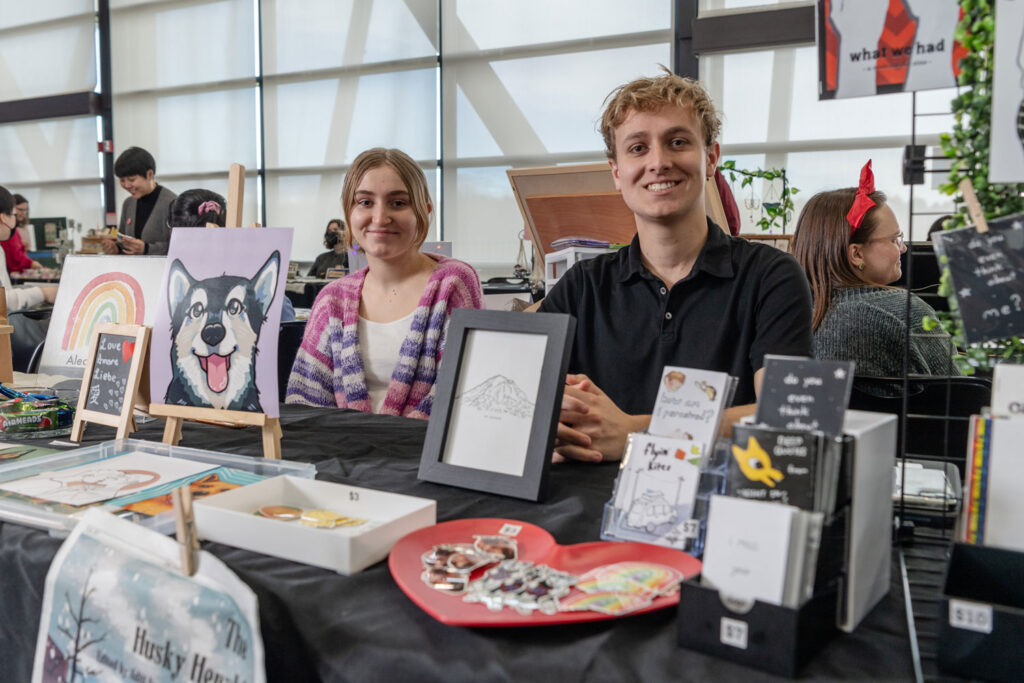
A queer man himself, Mullen-DeLand also said he uses his art to advocate for others looking for a sense of belonging. One zine, for example, is devoted to the coming out process and contains queer stories based on interviews he conducted with other UW students.
“I love seeing queer people, or families of a queer child, find my queer culture stories,” he said. “When a supportive parent buys my queer art for their child, it warms my heart and makes me feel hopeful for the next generation of queer youth.”
Mullen-DeLand added that he enjoyed talking with all the people who stopped by his booth at the fair. “Events like this have brought back the community vibe of UW Bothell,” he said. “Campus life had been slow coming out of the pandemic, and this really brought some life and color. It was fun to see some of my classmates walking around. Most of them didn’t know I had a small art business.”
Events like this have brought back the community vibe of UW Bothell. This really brought some life and color.
Alec Mullen-DeLand, senior, Media & Communication Studies
Overcoming obstacles
Some people become makers out of necessity. Eesha Kalki, a first-year student studying Biology, started to make her own jewelry when she couldn’t find styles she liked. She began with custom earrings and ear cuffs for herself but soon started to experiment with other types of jewelry, gifting them to family and friends.
It was only recently that she considered selling her work, under the name of Mochai Art and Jewelry, and the Makers Fair was her first time showing her products to a live — and attentive — audience.
“When I first walked in to set up, I was a bit intimidated. So many people had extravagant displays, with some of the most unique, fun products I’d ever seen,” Kalki said. “I felt underprepared. All I had was my jewelry in baggies, some paper signs and a flower tree for decoration.”
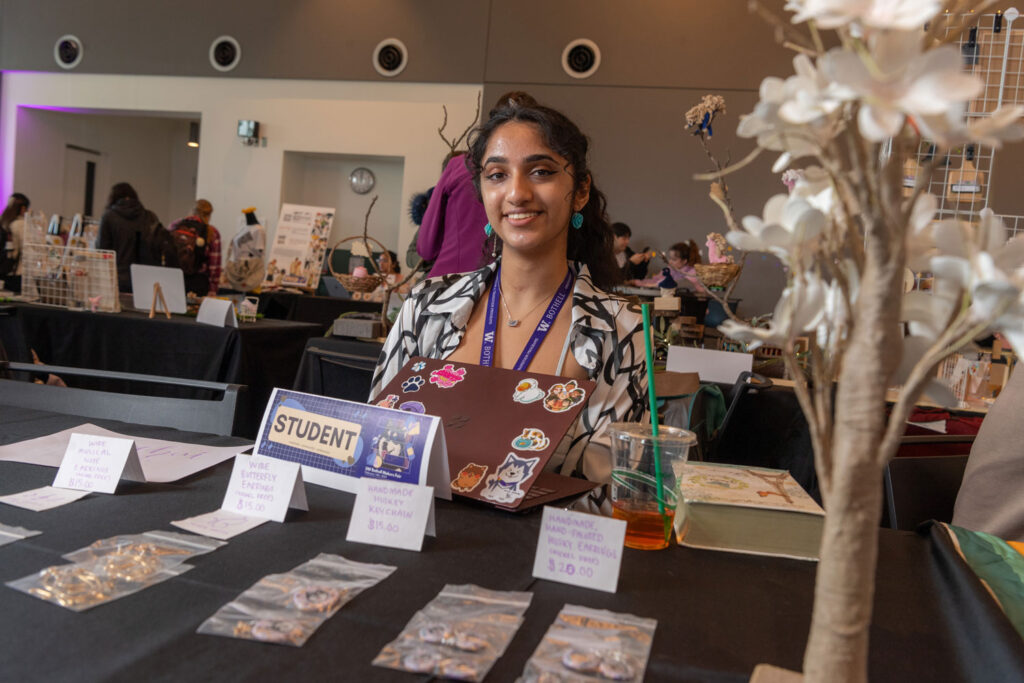
Kalki was overcome with emotions once the doors to the fair opened: Afraid that no one would buy her products, concerned that she’d overestimated her abilities and anxious about speaking to potential customers.
Using problem-solving skills that both studying biology and making jewelry require, she said, she carefully observed how seasoned vendors managed their booths and then adopted their techniques. “I greeted each customer who walked by and asked them about their day,” she said. “If they stopped, I would tell them a little about myself and show them my products. The more I did this, the more comfortable I felt — and the more products I sold.
“I remember wanting to cry after my first sale because it was reassurance that I was doing well,” she said, noting proudly that by the end of the day she had sold more than half of her inventory.
Progress through practice
Dr. Miryha Runnerstrom, assistant professor in the School of Nursing & Health Studies, said she learned how to knit and crochet as a child from her mother and grandmother. She wasn’t immediately hooked, but in graduate school, as she studied how creative activities can improve health and well-being, she returned to textile arts.
“In my free time, I learned how to dye wool fibers and how to spin them into yarn for knitting. My textiles practice really helped me to destress during graduate school, plus it connected me to a community of makers who I am still in touch with today,” Runnerstrom said. “As a student, it was so helpful to have this creative outlet to lean on when I needed to reset and recharge.
A “multicraftual” maker and owner of Blarney Yarn, Runnerstrom dyes wool spinning fibers that she then spins into yarn for sweaters and shawls. She weaves functional textiles such as hand towels and napkins. Recently, she added sewing to her creative practice.
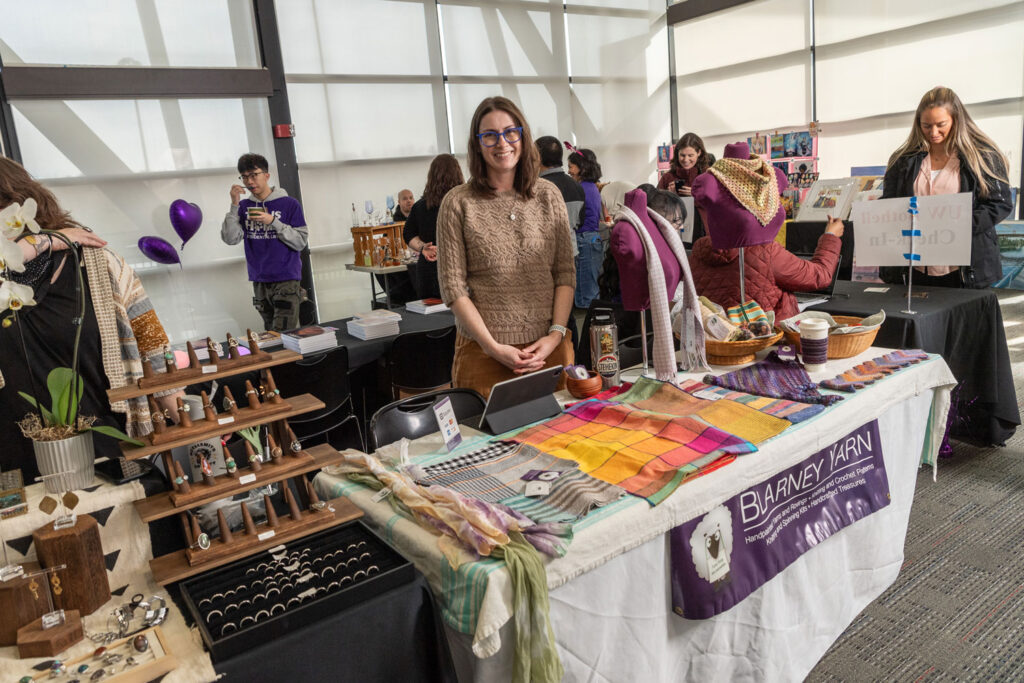
The art of making requires learning through practice, which Runnerstrom also relates to active learning in her classrooms at UW Bothell. She makes space for her students to immerse themselves in a variety of activities, including free writing, group projects and even role-playing.
“I’ve been both an academic and textile artist for nearly two decades. I don’t know that these halves really blend, but I do feel that each half enriches the other half,” she said. “I find a lot of joy through making and through teaching.”
Thinking bigger
Stacey Butler, director of SEA, said that the charge this year to the SEA staff was to “think big” when planning events. When Reduque and Tolentino pitched their dream of a Makers Fair at UW Bothell, Butler knew it had great potential to be “very big,” albeit requiring much work and many hours.
“Pauline and Jireh made the dream come true and also made sure both vendors and attendees had the best experience possible,” Butler said. “This event was wildly successful, not just because of its incredible turnout of more than 600 people but also because of the impact it had on our student populations.
“Weeks later, students are still talking about how much fun they had. That’s a sign of success.”

